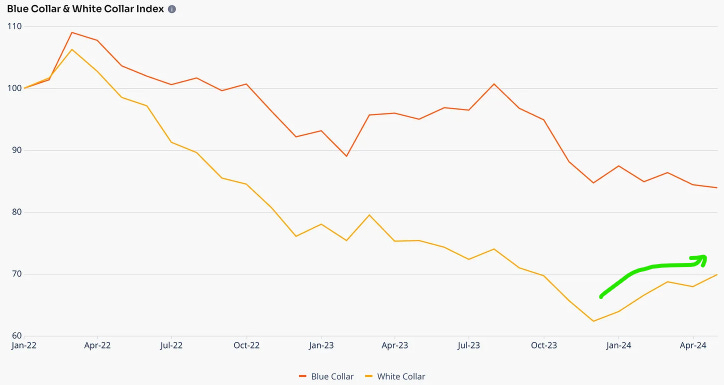
Hello, and happy Sunday! It’s summer blockbuster season, and so far, it seems like no one has noticed. The Memorial Day box office, which officially kicked it off, was down 20 percent from last year, and it’s only been more bad news since then—at the current rate of decline, 2024 ticket sales could be down 6–11.5 percent. We saw Furiosa: A Max Max Saga (epic), Challengers (horny and well done), and The Fall Guy (stupid and fun). Movies are an art form! Go see them in the theater if you want them to endure.
Now, on to everything we published this week, along with our take on the latest tech and business news.—Kate Lee
Was this newsletter forwarded to you? Sign up to get it in your inbox.
Our stories
"The Misfit Who Built the IBM PC" by Gareth Edwards/The Crazy Ones: In the early 1980s, IBM executive Don Estridge achieved the impossible—he created the IBM PC in just 12 months, seizing 70 percent of the microcomputer market. How did he do it? By breaking all of IBM's rules and assembling a team of quirky underdogs in the corporate backwaters of Florida. Read this to learn about the man who ushered in the era of personal computing, only to be betrayed by the company he loved.
🔏 "How AI Can Supercharge Your Favorite Productivity Frameworks" by Stella Garber: Garber, the former head of marketing at Trello, walks us through how ChatGPT can level up tried-and-true productivity techniques like the Eisenhower matrix and the Pomodoro method. Read this if you want to learn how to use AI to capture information, categorize your to-do list, manage your calendar, and even be your creative sidekick.
🎧 "Is NotebookLM—Google's Research Assistant—the Ultimate Tool for Thought?" by Dan Shipper/Chain of Thought: NotebookLM is Google's new AI-powered research tool that allows you to upload sources, ask questions, and generate insights. In this episode, Dan and bestselling author Steven Berlin Johnson use it to find Steven’s next book idea. If you want to see how one of the world’s most successful authors uses AI to write, this is the episode. 🔏 Paid subscribers have access to the episode transcript.
"LLMs Turn Every Question Into an Answer" by Dan Shipper/Chain of Thought: Language models expand any prompt you give them into something new—an answer, a story, an entire world of possibilities. In the second installment of his series on redefining creativity in the age of AI, Dan explores how you can use language models as comprehensive, contextual, and creative expanders to level up your work and imagination. Read this to learn how to harness the power of generative AI for your own creative purposes.
"AI Is Transforming the Nature of the Firm" by Evan Armstrong/Napkin Math: Economist Ronald Coase argued that firms exist to reduce transaction costs. Platforms like Uber and Airbnb have followed this playbook, using technology to minimize search, bargaining, and enforcement costs. AI is poised to revolutionize these dynamics by seamlessly connecting various applications and workflows, automating tedious tasks, and potentially reshaping how companies operate and interact. Read this to understand how AI, as a universally flexible technology, could be the last technology we ever need.
The backchannel
Steven Berlin Johnson wrote about his experience on AI & I with Dan in his newsletter:
But the thing I also want to draw your attention to is how much Dan is driving the process, by suggesting a series of prompts that ultimately elicit some astonishing—even to me—results from NotebookLM…What you can see in this sequence are two things: 1) a remarkably capable language model doing things with a large corpus of source material that would have been unthinkable just a year ago really—but just as importantly 2) a very smart human being who knows how to probe the source information and unlock the skills of the language model to generate the most useful and interesting results. The skill that Dan displays here is basically all about being able to think through this problem: Given this body of knowledge, given the abilities and limitations of the AI, and given my goals, what is the most effective question or instruction that I can propose right now? I don't know whether you're better off with a humanities background or an engineering background in developing that talent, but I do believe it has become an enormously valuable talent to have.
On the heels of his profile of MSCHF, Evan solicited feedback on X about which startup he should profile next. The complete list:
Arc (aka The Browser Company), Block, Corteiz, Cosmos, Daylight, Discord, Gumroad, Halide, Huckberry, Kino, Liquid Death, Mad Happy, Masterclass, Melanzana, Metalabel, Midjourney, Not Boring, Nothing, Nothing, Notion, Ojas, Phish, Poolsuite, Prophetic, Rainmaker, Rive, Runway, Superhuman, Superplastic, Teenage Engineering, Telfar Paynter, Tldraw, Vacation Inc., Wander, Whoop, Yuga Labs
Reply in the comments with which one you’d like him to cover, or if there are any missing.
Want to chat? DM Dan or Evan on X.
Chain of links
The AI backlash grows. Tweets are only one signal (that I mostly ignore), but 650,000 users of an anti-AI art and social media platform Cara is something everyone should pay attention to. Outside of tech’s rich and happy little bubble, the majority of signs point to a major backlash. This is a storm brewing—now we have the user data to prove it.
More models, more money, more problems? Pika, a generative AI video startup, has raised $80 million in venture capital at a $470 million valuation. The founders are competing against Runway, OpenAI, and all of big tech. The deal is fascinating because for the first time in a long time, investors are writing big checks to underwrite technical risk. I hope to see more of this kind of ambition among the Patagonia vest-wearing class.
Sam Alt-man-of-mucho-conflicts-of-interest. When the board first fired Sam Altman, I wrote that his investing activity in companies OpenAI was involved in, coupled with his desire to start a chip company that would sell to OpenAI, was “enough conflicts of interest to make a corporate lawyer's brain smush in on itself like a dying sun.” The world is slowly waking up to this fact. The media is increasingly highlighting his activity, including a recent Wall Street Journal report that he holds stakes in more than 400 startups with holdings worth $2.8 billion. The response from OpenAI is essentially that the company has a conflict-of-interest policy. I’m sure they do! But there will always be a feeling among some (myself included) that someone in charge of building AGI, the most important technology ever created, should have zero conflicts of interest.
AI has already started taking jobs. A new study revealed a decrease in job listings because of ChatGPT. The researchers broke the listings down into three categories: “manual-intensive jobs (e.g., data entry, video services, and audio services), automation-prone jobs (e.g., writing, engineering, software, app, and web development), and image-generating jobs (e.g., graphic design and 3D modeling).” Relative to manual-intensive jobs, automation-prone jobs were down 21 percent, with writing as the highest sub-category, down 30 percent. Image-generating jobs were down 17 percent. There are some macro factors at play here—software engineering jobs have been decreasing for a while. However, I think this is one of the first studies showing that ChatGPT is already putting people out of work. (See below for another perspective on hiring data.) —Evan Armstrong
The napkin math
Somehow, crypto M&A returned. Robinhood is planning to acquire crypto exchange Bitstamp for $200 million. I’m on the record for being unconvinced by crypto’s grand promises, but I would never be so foolish as to deny that there is money to be made in the sector. This transaction is another signal that the crypto party is back on.
TikTok for me, not for thee. Donald Trump joined TikTok this week (remember how he tried to ban/sell it to Oracle?) as a form of voter outreach and because the platform has a 2:1 ratio of pro-Trump to pro-Biden content. We don’t cover politics here—thank goodness—but this story is noteworthy because many of the companies that get vilified by our political class are targeted on the basis of personal benefit. Monopoly? Pshaw. Chinese spy app? Who cares! My rule of thumb: View all government actions as at least a little selfishly motivated, even in cases of business regulation.
This is how the GameStop livestream ends—not with a gain, but with a whimper. Roaring Kitty, the memestock investor famous for his Gamestop position, returned to YouTube to discuss his new position in the company in a livestream. When the stream started, the stock jumped 20 percent. However, as he started to explain his position and why he had invested (the short version of his thesis would probably be a shrug emoji), the stock started trending downward, and by the end, it was down roughly 40 percent. It was a surreal experience to watch someone lose over $200 million dollars. —EA
For the love of charts
White-collar jobs are back, baby! After a brutal two-year stretch of slow hiring for white-collar workers, there’s some evidence that skilled practitioners of “hopping on a call,” “shooting emails,” and “circling back” are back in demand:
Source: LinkUp.Job postings for white-collar workers have been trending upward since the beginning of 2024. White-collar job stagnation has been very real, so this is welcome news. It’s unclear what’s causing it or how enduring it will be, but if anything, perhaps AI is acting as a tailwind rather than a headwind, for now. After two years of getting lean, companies are expending huge amounts on AI initiatives, and spending money is something of a white-collar specialty.—Moses Sternstein
The examined life
Genius is in the details. I’ve been into watching videos of masters discussing their work lately. My latest find is a Vanity Fair series called “Break Down a Scene.” Actors and directors explain the thought and care that goes into each shot. It is remarkable learning about the days of effort and millions of dollars that will go toward 20 seconds of screen time. Some of my favorites include Rian Johnson’s focus on perfect framing with the cast of Knives Out, Mark Mylod on the balance between obsession for detail and spontaneity in directing Connor’s wedding on Succession, and Emerald Fennel on how she manifested her vision in the hiring of the team she assembled for Saltburn.—EA
Eye candy
What if Spotify brought back the Sony Walkman?
Source: X/Lucas Crespo.That’s all for this week! Be sure to follow Every on X at @every and on LinkedIn.
Find Out What
Comes Next in Tech.
Start your free trial.
New ideas to help you build the future—in your inbox, every day. Trusted by over 75,000 readers.
SubscribeAlready have an account? Sign in
What's included?
-
Unlimited access to our daily essays by Dan Shipper, Evan Armstrong, and a roster of the best tech writers on the internet
-
Full access to an archive of hundreds of in-depth articles
-
-
Priority access and subscriber-only discounts to courses, events, and more
-
Ad-free experience
-
Access to our Discord community
Thanks to our Sponsor: Growth School
200+ hours of research on AI tools and hacks packed into 3 hours
The only AI crash course you need to master 20+ AI tools, multiple hacks, and prompting techniques in just three hours.
Trust us, you will never waste time on boring and repetitive tasks ever again. Get the crash course here for free (valid for the next 24 hours only).
This course on AI has been taken by 1 million people across the globe, who have been able to:
- Build business that make $10k/mo by just using AI tools
- Make fast and smarter decisions using AI-led data insights
- Write emails, content, and more in seconds using AI
- Solve complex problems, research 10x faster, and save 16 hours every week






Comments
Don't have an account? Sign up!